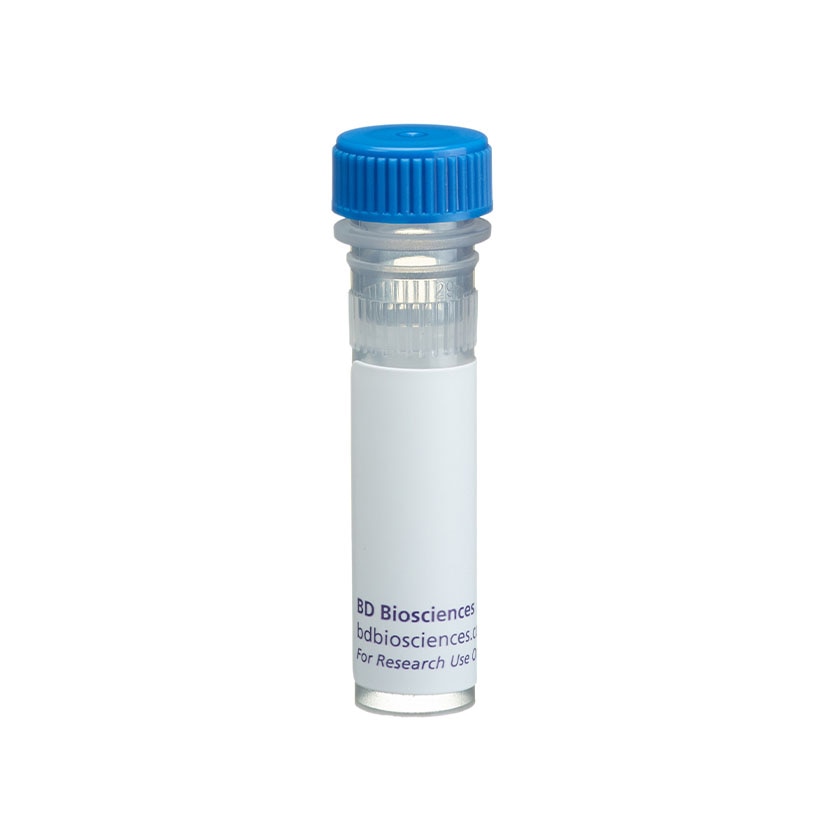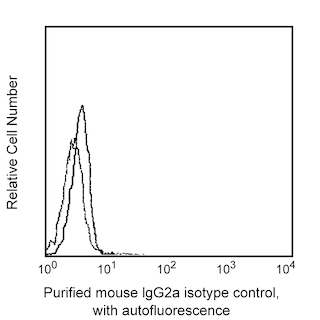Old Browser
This page has been recently translated and is available in French now.
Looks like you're visiting us from {countryName}.
Would you like to stay on the current country site or be switched to your country?




Flow cytometric profile of CD49B expression on human peripheral blood platelets. Platelets were stained with either Purified Mouse Anti-Human CD49b (Cat. No. 555668, solid line histogram) or Purified Mouse IgG2a, κ Isotype Control (Cat. No. 555571, dashed line histogram). Secondary staining was carried out with FITC Goat Anti-Mouse IgG/IgM (Cat. No. 555988). Fluorescence histograms depicting CD49B expression (or Ig isotype control staining) was derived from gated events with the side and forward light-scatter characteristics of viable lymphocytes.


BD Pharmingen™ Purified Mouse Anti-Human CD49b

Regulatory Status Legend
Any use of products other than the permitted use without the express written authorization of Becton, Dickinson and Company is strictly prohibited.
Preparation And Storage
Product Notices
- Since applications vary, each investigator should titrate the reagent to obtain optimal results.
- An isotype control should be used at the same concentration as the antibody of interest.
- Caution: Sodium azide yields highly toxic hydrazoic acid under acidic conditions. Dilute azide compounds in running water before discarding to avoid accumulation of potentially explosive deposits in plumbing.
- For fluorochrome spectra and suitable instrument settings, please refer to our Multicolor Flow Cytometry web page at www.bdbiosciences.com/colors.
- Sodium azide is a reversible inhibitor of oxidative metabolism; therefore, antibody preparations containing this preservative agent must not be used in cell cultures nor injected into animals. Sodium azide may be removed by washing stained cells or plate-bound antibody or dialyzing soluble antibody in sodium azide-free buffer. Since endotoxin may also affect the results of functional studies, we recommend the NA/LE (No Azide/Low Endotoxin) antibody format, if available, for in vitro and in vivo use.
- Please refer to www.bdbiosciences.com/us/s/resources for technical protocols.
Companion Products



.png?imwidth=320)
The 12F1 monoclonal antibody specifically binds to CD49b. CD49b is also known as the integrin α2 chain (VLA-α2), a member of the integrin family of extracellular matrix and cell-cell adhesion receptors. VLA-α2 is non-covalently associated with VLA-β1 chain (CD29) in the VLA-2 complex. α2 is expressed on numerous cell types including activated T cells, platelets, and long-term cultivated T cells. α2β1 is a well-established receptor for collagen. This antibody is useful for studies of integrin expression and function.
Development References (4)
-
Hemler ME, Kawaguchi S, Bodorova J. CD49b cluster repoty. In: Schlossman SF. Stuart F. Schlossman .. et al., ed. Leucocyte typing V : white cell differentiation antigens : proceedings of the fifth international workshop and conference held in Boston, USA, 3-7 November, 1993. Oxford: Oxford University Press; 1995:1615-1616.
-
Hemler ME. VLA proteins in the integrin family: structures, functions, and their role on leukocytes. Annu Rev Immunol. 1990; 8:365-400. (Biology). View Reference
-
Knapp W. W. Knapp .. et al., ed. Leucocyte typing IV : white cell differentiation antigens. Oxford New York: Oxford University Press; 1989:1-1182.
-
Schlossman SF. Stuart F. Schlossman .. et al., ed. Leucocyte typing V : white cell differentiation antigens : proceedings of the fifth international workshop and conference held in Boston, USA, 3-7 November, 1993. Oxford: Oxford University Press; 1995.
Please refer to Support Documents for Quality Certificates
Global - Refer to manufacturer's instructions for use and related User Manuals and Technical data sheets before using this products as described
Comparisons, where applicable, are made against older BD Technology, manual methods or are general performance claims. Comparisons are not made against non-BD technologies, unless otherwise noted.
For Research Use Only. Not for use in diagnostic or therapeutic procedures.
Report a Site Issue
This form is intended to help us improve our website experience. For other support, please visit our Contact Us page.